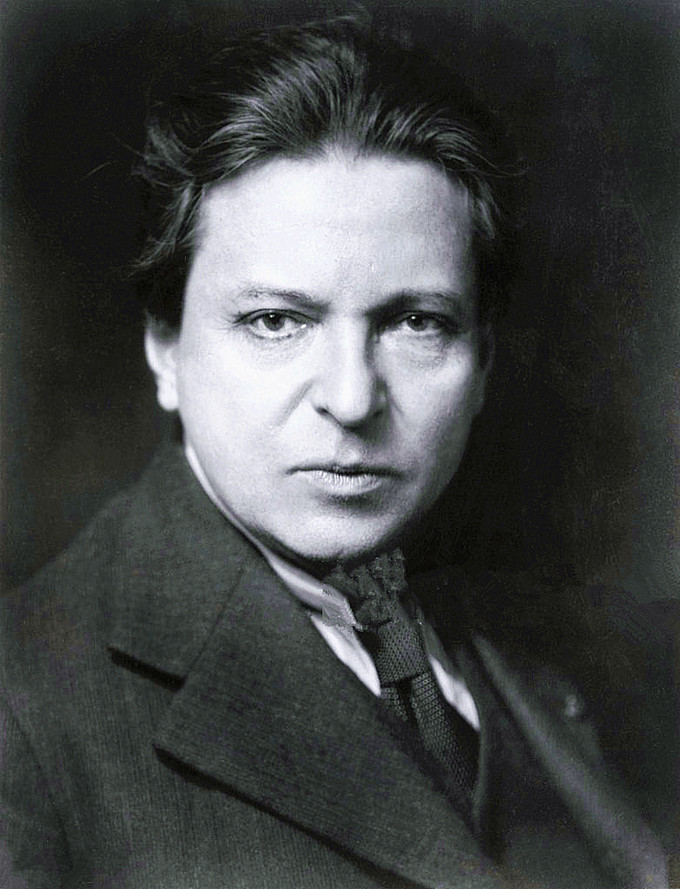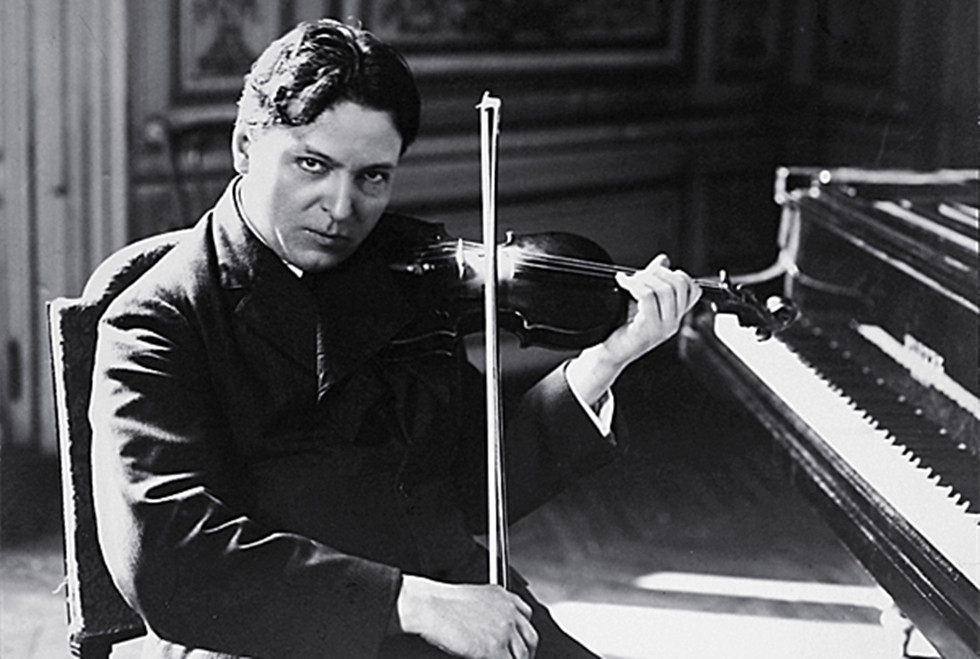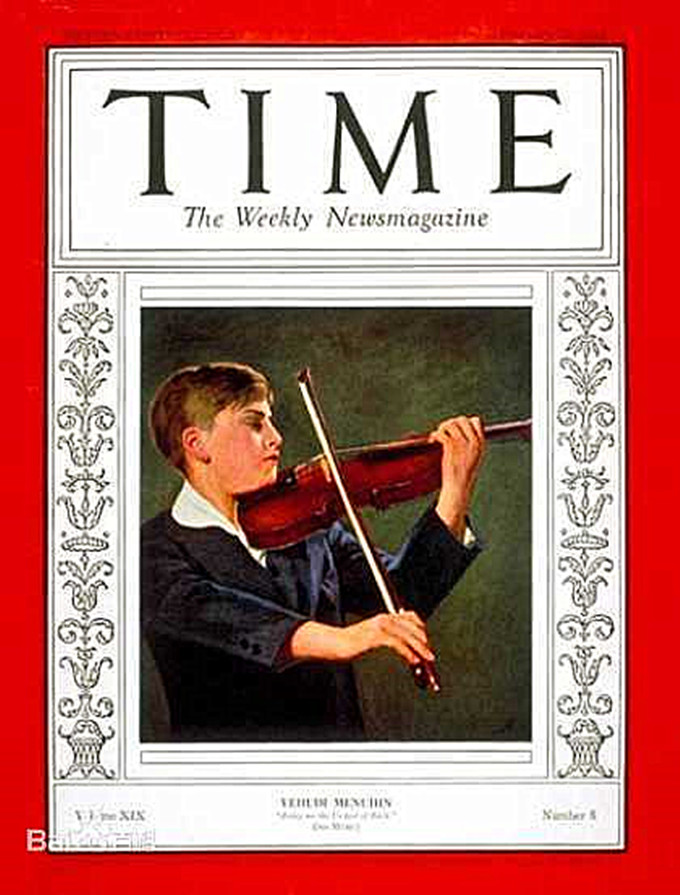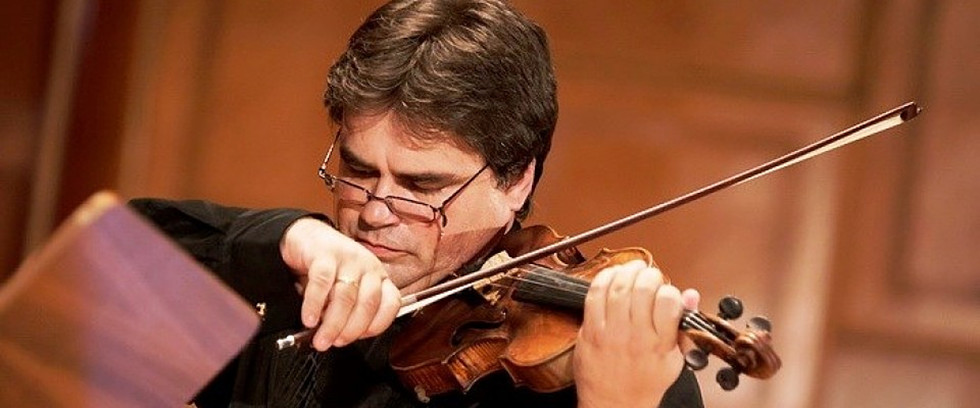| |
|
|
|
|
|
|
|
|
|
|
| |
| |
 |
|
| |
田润德
编译
文/图 2020-03-10 16:36 |
|
| |
|
|
|
|
| |
 |
|
|
|
| |
乔治·埃内斯库(George Enescu,
1881-1955) |
|
|
|
| |
|
|
|
|
| |
乔治·埃内斯库 罗马尼亚第一狂想曲 柏林爱乐乐团演奏 指挥 杨松思
George Enescu - Romanian Rhapsody
|
|
|
|
| |
|
|
|
|
| |
音乐历史上的今天
1936年3月10日,当乔治·埃乃斯库的作品《俄狄浦斯》在巴黎歌剧院上演时,这位罗马尼亚小提琴家兼作曲家在彩排中因为争风吃醋,把自己价值连城的瓜奈利名琴砸坏了。
乔治·埃内斯库(George Enescu,
1881-1955),著名作曲家、指挥家、小提琴家、钢琴家、音乐教育家,是罗马尼亚民族音乐的奠基人。埃内斯库的创作深受罗马尼亚民族音乐的影响,作品感情真挚、技巧娴熟,以《罗马尼亚狂想曲》最为著名。他以动人的民间音乐素材、雄浑的气魄,体现了罗马尼亚人民丰富的情感,为罗马尼亚的音乐在世界上赢得了荣誉。
人们常说伟大的艺术家在演奏当中是极富想象力和创造性的,乔治·埃奈斯库正是这种能够给人们留下永恒印象的伟大艺术家。在小提琴演奏艺术当中,埃奈斯库是一个能在自由王国的境界中任意驰骋的人,由于他本身是一位杰出的作曲家,因此在演奏的过程中始终洋溢着带有丰富即兴色彩的创作激情。正是由于这一点,有的评论家才将他称作是具有无穷魅力的“小提琴音乐诗人”。
作为小提琴家,他是20世纪早期世界杰出的小提琴演奏大师,在他那卓越的演奏生涯中,成功地将法比小提琴学派的优良传统与罗马尼亚民族器乐富有特色的演奏技法和特点相结合,开创出了一条崭新的小提琴演奏艺术道路。作为钢琴家,他的深刻造诣和修为广为人知,甚至连现代钢琴泰斗阿瑟.鲁宾斯坦都赞叹道:“他是使我都感到眼红的了不起的钢琴家”。作为指挥家,他的足迹遍及欧美各国,并有着从托斯卡尼尼的手中接班指挥著名的纽约爱乐乐团的不凡经历。作为作曲家,他一生辉煌的创作使其成为罗马尼亚民族乐派的主要代表人物,并为后人留下了《罗马尼亚音诗》以及《第1、2号罗马尼亚狂想曲》、《小提琴奏鸣曲》和歌剧《俄狄浦斯王》等大量不朽的杰作。作为音乐教育家,他曾是20世纪早期小提琴教学领域中十分具有影响力的头面人物,在其不同凡响的教学生涯中,曾经培养出像耶胡迪·梅纽因、阿图尔·格雷米欧和埃达·亨德尔这样一些在日后小提琴艺术界中倍放光芒的人物。
今日视频:1、杨松思指挥柏林爱乐乐团演奏埃奈斯库的《罗马尼亚第一狂想曲》;2、加布里埃尔·克洛伊托使用埃奈斯库的瓜奈利小提琴演奏小提琴音乐会。 |
|
|
|
| |
.jpg) |
|
| |
作曲的乔治·埃内斯库(George Enescu,) |
|
|
|
| |
 |
|
| |
演奏小提琴乔治·埃内斯库(George Enescu,) |
|
|
|
| |
Today in music
history
On March 3, 1875, the opera Carmen was premiered at the opera d 'opera
in Paris and failed miserably.The contemporary generation was "shocked
and offended by the bold realism and naked emotion" of his work,
accusing it of "obscenity" and "music without meaning".Bizet is said to
have spent a miserable night wandering the streets of Paris.
George bizet was born in Paris, France, on October 25, 1838, in an
ordinary musical family.His father is a vocal music teacher, his mother
can play the piano, and his uncle is a famous singer and music educator.
Bizet showed an aptitude for music from an early age, but he preferred
literature.It was his love for literature that expanded his imagination
in music.
He could read music at the age of four, and when his father began
teaching him the basics of music, he was surprised to find that his son
already knew a lot.Under the careful cultivation of his parents and
uncle, young bizai made rapid progress. At the age of 9, he was admitted
to the Paris conservatory of music and became the youngest student
there.His academic performance in the college of music is among the
best, and he has won many prizes in various competitions organized by
the college.His excellent piano performance, there is still a story: in
a family music evening, bizai was lucky to meet the "king of the piano"
liszt.Liszt took out his latest work to tell you, in addition to his
own, this very difficult work is probably only liszt's son-in-law,
Germany's famous pianist feng biao luo can play down completely.At that
time, at the age of 13, bizai expressed his willingness to give it a
try.Liszt exclaimed on the spot: "I thought there were only two people
in the world who could play this song, but what I didn't expect was that
there were three!Besides, he is the youngest, the boldest, the most
brilliant of us all!"
However, the tragic events experienced by the motherland and the nation
not long ago will inevitably leave their mark on bizai.The heavy test
increased the national consciousness and strengthened the democratic
tendency of his writing.Selfless creative exploration made bizai through
the crisis of the 1960s, into the mature period of creation.
When "Carmen" was first performed in March 1875, the reaction in Paris
was so lukewarm that subsequent performances were not as successful as
they should have been, and bizet is said to have spent the night
wandering the streets for this reason, contributing to his untimely
death.But others think that the success of the opera Carmen has little
to do with the fact that he died earlier than he did, because he had
been suffering from a throat disease for many years, possibly cancer,
but had suffered a heart attack and died suddenly as his condition
worsened.Bizet died in brival, near Paris, on June 3, 1875, three months
after the premiere of Carmen. He was not yet 37.
Bizet was already the author of many works during his school years. When
he was 17, he wrote the symphony in C major, which was famous for its
concise form, vivid expression and bright colors, all of which later
became an integral part of his unique style.When he graduated from the
conservatory in 1857, he won the Rome prize for a cantata and a one-act
operetta at a competition hosted by Offenbach.
Bizai won the Rome prize and enjoyed the opportunity to study in
Italy.During his three years in Italy, he read a great deal of
literature, studied the history of art, spent long hours visiting
ancient ruins, mansions, museums and galleries, and became familiar with
the monumental works of Italian classical painting and sculpture.At this
time, he had a number of writing projects, although he has not found a
suitable topic, but his interest in the theater music has been very
clear.While in Rome, he wrote his first comic opera, in a style close to
that of Mozart and rossini.
At the end of 1860, due to the death of his mother, bizai returned to
the motherland and his youth came to an end.Since then, he has embarked
on the path of independent living and striving to become a recognized
composer.It is evident that the bizet as an artist is superior to the
bizet as a citizen.However, the tragic events experienced by the
motherland and the nation not long ago will inevitably leave their mark
on him;The heavy test led to a rising national consciousness, which also
reinforced the democratic tendency of his works.Selfless creative
exploration and practice enabled him to finally get through the crisis
of the late 1960s and enter the mature period of creation.
In the second half of his life, bizet was almost always nervous and hard
up.Some of the types of operas he conceived were finished, but strict
poets took them back from the theatre, for example, because his "Ivan
the terrible" was not discovered until the 2030s.However, two operas
were less successful when they were performed in 1863.
A succession of failures made bizet feel depressed for a time.It was in
those years that he wrote the words "I'm in crisis" in his only
published paper.The franco-prussian war and the brief days of the Paris
commune stirred up even greater incongruity in bizet.In the early 1970s,
he wrote a series of concert works and composed twenty-seven pieces of
music for dudu's play "the girl of allais," but it was the last opera of
the same name, written in 1874, based on chapters of merrime's novel
"Carmen," that was his most famous.
In describing the main characteristics of bizet, saint sang once summed
him up as "young, energetic, optimistic and full of vitality".These
words can also be used to illustrate the main feature of his music, that
is, he always shows the contradictions of life with a bright and
cheerful optimism. This is the special quality of his music.
Today's video: 1. Carmen by the Metropolitan Opera; 2.2. The Stockholm
royal philharmonic orchestra performs bizet: suite I and suite ii of the
girls of allais, conducted by Natalie stutzman. |
|
|
|
| |
|
|
|
|
| |
.jpg) |
|
|
|
| |
乔治·埃内斯库(George
Enescu)和他的学生耶胡迪·梅纽因(Yehudi
Menuhin,1916-1999) |
|
|
|
| |
| |
.jpg) |
|
|
|
| |
乔治·埃内斯库(George
Enescu)和他的学生耶胡迪·梅纽因 |
|
|
|
|
|
| |
 |
|
|
|
| |
美国时代周刊封面的耶胡迪·梅纽因 |
|
|
|
| |
耶胡迪·梅纽因(Yehudi
Menuhin,1916-1999),美国小提琴家,犹太人。7岁在其师帕辛格指挥的旧金山交响乐队伴奏下演出拉罗《西班牙交响曲》,被誉为“神童”。曾在纽约交响乐队伴奏下演出贝多芬小提琴家的行列。与欧洲、美国的主要交响乐队伴奏下演出贝多芬小提琴协奏曲,此后在卡内基大厅举行独奏会,从而进入世界著名小提琴家的行列。战后访问过苏联、以色列、日本、印度,对东西方文化交流起过一定作用。七十年代出版了他的自传《未完的历程》。他的演奏具有辉煌的技巧、独特的气质和动人的魅力。
11岁时,梅纽因结识了罗马尼亚著名音乐家埃乃斯库,他俩的忘年交在音乐界传为佳话。梅纽因曾说:“如果是布希教会了我严谨、精确和权威,那么是埃乃斯库点燃了我的想象力。”1932年,16岁的梅纽因同75岁的英国著名作曲家埃尔加同台演出后者的小提琴协奏曲,被认为是迄今为止这部作品最优秀的录音。在以后的岁月中,他还成为苏联小提琴家奥伊斯特拉赫的好友;在芬兰作曲家西贝柳斯的90岁生日庆祝晚会上演奏他的小提琴协奏曲;而当他1962年再次访问苏联时,不仅将肖斯塔科维奇引为新朋,作曲家的第一小提琴协奏曲也加入了他日益扩展的演出曲目。有人说,梅纽因在音乐界的广泛友谊就是20世纪音乐史的写照。 |
|
|
|
| |
Yehudi Menuhin
(1916-1999) was an American violinist and Jew.At the age of seven, she
was praised as a "child prodigy" when she performed raro's "Spanish
symphony" with the San Francisco symphony orchestra under the direction
of her division passinger.Performed as a Beethoven violinist with the
New York symphony orchestra.Performing Beethoven's violin concerto with
major orchestras from Europe and the United States, followed by a
recital at Carnegie Hall, he entered the ranks of the world's most
famous violinists.After the war, he visited the Soviet union, Israel,
Japan and India, which played a certain role in the cultural exchanges
between the east and the west.In the 1970s he published his
autobiography, the unfinished journey.His performance has brilliant
skill, unique temperament and moving charm.
At the age of 11, menuhin met the famous romanian musician enescu, and
their friendship became a legend in the music industry.Menuhin once
said, "if bush taught me rigor, precision and authority, enescu ignited
my imagination."In 1932, at the age of 16, menuhin performed a violin
concerto by elgar, 75, considered the best recording of the work to
date.In the years that followed, he became a friend of the Soviet
violinist oyster;Played the violin concerto of the Finnish composer
sebelius at his 90th birthday celebration;And when he visited the Soviet
union again in 1962, not only did he cite shostakovich as a new friend,
but the composer's first violin concerto was added to his expanding
repertoire.Some say menuhin's extensive friendship with the music world
mirrors the history of 20th-century music. |
|
|
|
| |
|
|
|
|
| |
 |
|
| |
加布里埃尔·克洛伊托鲁Gabriel Croitoru) |
|
|
|
| |
大师加布里埃尔·克罗伊托鲁,世界著名的小提琴家,来自罗马尼亚。他是1979年卢布林(Lublin)举行的维尼亚夫斯基国际小提琴比赛和1991年西班牙举办的萨拉萨蒂国际小提琴比赛的
金奖的获奖者,也是萨拉萨蒂作品的最佳诠释奖获得者。
他也是其他国际小提琴比赛的第一名,包括Tibor Varga(第二名,第一名空缺),帕格尼尼、弗里茨·克莱斯勒于1987年在齐诺·弗朗西丝卡蒂国际小提琴比赛中获得二等奖(一等奖空缺),被法国报纸誉为“技艺精湛的杰出小提琴家”。
1988年,克罗伊托鲁在帕格尼尼号协奏曲克劳德·巴登(Claude Bardon)的指挥下,与法国尼斯爱乐乐团(Nice
Philharmonic)合作录制了这张柴可夫斯基小提琴协奏曲CD。
1994年,雅克·博德默指挥的《马拉加交响曲(西班牙)》为加布里埃尔伴奏,为小提琴和管弦乐队演奏了萨拉塞特的全部作品,共3张CD。他作为独奏者在欧洲和亚洲的管弦乐队前表演了1000多场,包括伦敦皇家爱乐乐团、蒙特卡洛交响乐团、里昂交响乐团、Gewandhaus
Leipzig管弦乐团、加利西亚交响乐团、索菲亚女王室内管弦乐团、卢塞恩室内管弦乐团弦乐节等。
加布里尔曾在许多国家演出过,包括法国(上一次演出是在联合国教科文组织中心)、西班牙、德国、意大利、中国、保加利亚、前苏联。1982年参加著名的萨尔瓦多·阿卡多大师班,1988年参加奇诺·弗朗西丝卡蒂大师班。
他1983年毕业于布加勒斯特音乐高中,师从Mihai
Constantinescu教授,1987年毕业于布加勒斯特音乐大学,师从于迈泰•伊夫廷奇教授。他和Stefan
Gheorghiu教授在simoultanesly学习。
加布里埃尔·克罗伊托鲁目前是普罗莱斯蒂爱乐乐团(罗马尼亚)的永久独奏者,他是“特兰西瓦”国家弦乐四重奏的第一小提琴手,也是布加勒斯特音乐大学的小提琴特聘教授。2006年毕业于同一所大学,获博士学位,主要研究方向为萨拉萨蒂的艺术和作曲家的释意”。在一个赛季中,克罗伊托鲁的表现约为50次。
1999年,他赢得了由文化部长组织的评审团主席耶胡迪·梅纽因勋爵(Lord Yehudi
Menuhin)与“沃伊库”国际基金会,为使用罗马尼亚的斯特拉的瓦里小提琴的权利),这是大师Voicu在担任布加勒斯特爱乐乐团独奏时演奏过的。
多年来,多次参加国内外小提琴比赛。
2008年,他赢得了由文化部和“乔治·埃涅斯库”博物馆,争取使用“约瑟夫·瓜奈利”——大教堂的权利,建于1730年的克雷莫纳,属于著名的音乐家乔治·埃涅斯库。 |
|
|
|
| |
Maestro
Gabriel Croitoru, a world renowned Violinist from Romania. He
was the first prizewinner of both Henryk Wieniawski
International Violin Competition in Lublin, Poland-1979 and the
Pablo Sarasate International Violin Competition in Spain-1991 as
well as the best interpretation of works by Sarasate.
He is also the top prizewinner in other International Violin
Competitions including Tibor Varga (second prize,-first prize
not awarded), N.Paganini, Fritz Kreisler and has been hailed as
“an exceptional violinist with impeccable technique” in the
French papers after winning second prize (first prize-not
awarded) in Zino Francescatti International Violin Competition
in 1987.
Mr. Croitoru recorded on CD in 1988 with the Nice Philharmonic
(France), under the baton of Claude Bardon, Paganini’s concerto
no.1 and Tschaikovski’s violin concerto.
In 1994, the Malaga Symphony (Spain), conducted by Jacques
Bodmer, accompanied Gabriel performing the complete works by
Sarasate for violin and orchestra, in a set of 3 CD’s. He has
performed in over 1,000 performances as a soloist in front of an
orchestra throughout Europe and Asia, including London Royal
Philharmonic, Monte-Carlo Symphony, Lyon Symphony, Gewandhaus
Leipzig Orchestra, Galicia Symphony, Queen Sofia Chamber
Orchestra, String Festival of Lucerne Chamber Orchestra and many
others.
Gabriel has recitaled in numerous countries including France
(last recital was at the Unesco Center), Spain, Germany, Italy,
China, Bulgaria, ex-U.S.S.R., Hungary, Romania, etc. and took
part in the masterclasses of prestigious Salvattore Accardo in
1982 and Zino Francescatti in 1988.
Mr. Croitoru has been trained as a violinist in Romania, where
he graduated from the Music High School of Bucharest in 1983 in
the class of Prof. Mihai Constantinescu and from the Music
University of Bucharest in 1987, where he studied with Prof.
Modest Iftinchi. He studied in private simoultanesly with Prof.
Stefan Gheorghiu.
Gabriel Croitoru_Foto_Virgil Oprina 012Mr. Croitoru presently
holds the position of permanent soloist of Ploiesti Philharmonic
(Romania), he is the first violin of the “Transylvan” State
String Quartett and the position of Distinguished Professor of
Violin at the Music University in Bucharest. Since 2006, he has
obtained doctor’s degree in the same University, with the thesys
“PABLO SARASATE – Virtuosite interpretative et fantaisie
componistique”. Mr. Croitoru’s performances during a season are
about 50.
In 1999 he won the competition whose president of the jury was
Lord Yehudi Menuhin, organized by the Ministery of Culture, in
collaboration with the “I. Voicu” international funfation, for
the right to utilize the Romanian Stradivarius Elder)which
Maestro Voicu has played while he was soloist of the Bucharest
Philharmonic.
Along the years, he has been member of many national and
international violin competitions.
In 2008 he won the competition organized by Ministry of Culture
and the “G.Enescu” Museum, for the right to use the “Joseph
Guarneriusku– Cathedral, made in Cremona, in 1730, who belonged
to the famous musician George Enescu. |
|
|
|
| |
|
|
|
|
| |
【乔治 埃奈斯库】小提琴音乐会:加布里埃尔·克洛伊托
Gabriel
Croitoru与HoriaMihail在布加勒斯特广播音乐厅
|
|
|
|
| |
瓜尔内里名琴“Cathedral”曾是乔治
埃奈斯库的最爱,后被捐赠予罗马尼亚政府。2009年,小提琴家Gabriel
Croitoru通过比赛赢得了该琴的使用权,Cathedral如泣如诉的独特的琴音得以再次歌唱。本场音乐会是罗马尼亚文化部举办的“世纪之声”系列演出的一部分,于2018年10月8日录制于布加勒斯特广播音乐厅。
小提琴:Gabriel Croitoru
钢琴:Horia Mihail
曲目(不含加演,有出入):
M. de Falla: Spanish Folk Suite
N. Paganini: Cantabile, MS 109
A. Dvořák: Humoresque, Op. 101
P. I. Tchaikovsky: Meditation, Op. 42
Fr. Kreisler: Londonderry Air
E. Bloch: Nigun
Dumitru Capoianu: Song without words
W. A. Mozart: Rondo in Major Ground
Fr. M. Veracini: Largo
George Enescu: Ballad
C. Saint-Saëns: The death of the Swan of the Animal
Carnival
Fr. Kreisler: La Gitana
J. Suk: Love song, op. 7 no. 1
Gabriel Fauré: Après un rêve
Fr. Kreisler: Siciliana and Rigaudon
A. Glazunov: Grand Adagio
Fr. Kreisler: Malaguena
Ciprian Porumbescu: Ballad
C. Saint-Saëns: Dance macabre |
|
|
|
| |
|
|
|
|
| |
未得原作者编者授权严禁转载www.mt77.com任何内容 |
|
|
|
|
|
|
|
|
|
|
|
|
|
|


